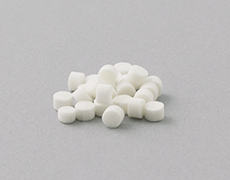Newsletters
Use of Atelocollagen Sponge Mighty for osteoarthritis model preparation
06 April 2017
In this edition of the newsletter, we introduce a paper describing mechanically stressed cultures of synovial fibroblasts using Atelocollagen Sponge Mighty.
Osteoarthritis model using strong collagen sponge
Article information
Cyclic compressive loading on 3D tissue of human synovial fibroblasts upregulates prostaglandin E2 via COX-2 production without IL-1β and TNF-α.
Shimomura K, Kanamoto T, Kita K, Akamine Y, Nakamura N, Mae T, Yoshikawa H, Nakata K.
Bone Joint Res. 2014 Sep;3(9):280-8. PMID: 25237168
Overview
Osteoarthritis (OA) is a common disease that causes joint pain, deformity, and dysfunction; the number of patients with OA has expanded to several hundred million people worldwide.
OA involves various degrees of synovitis; synovial fibroblasts and synovial macrophages play an important role in the onset of OA via synovitis.
The authors assessed the effect of repetitive mechanical stress on 3D cultured human synovial fibroblasts (an in vitro arthritis model), specifically testing the expression level of prostaglandin E2 (PGE2), an inflammatory mediator that plays a role in the pain, inflammation, and cartilage degradation associated with OA.
The authors also assessed treatment of OA, by conducting experiments with the in vitro arthritis model to clarify the effects of nonsteroidal anti-inflammatory drugs (NSAIDs) and steroidal anti-inflammatory drugs (SAIDs) that are widely prescribed for OA.
Mechanical stressing of 3D-cultured human synovial fibroblasts using Mighty significantly increased the level of PGE2 and the expression level of COX-2, an enzyme involved in the synthesis of PGE 2.
Next, these experiments were repeated in the presence of COX-2 selective inhibitors, specifically one of the NSAIDs or dexamethasone (a SAID known to inhibit COX-2 activity,).
The level of PGE2 was shown to be dose dependent, indicating that this experimental system will be useful for understanding the pathology and treatment of OA.
Atelocollagen sponge with a random pore structure and strength similar to that of cartilage
Product name
– Atelocollagen Sponge, MIGHTY 25 pcs/bottle (Cat. No.: CSM-25)
– Atelocollagen Sponge, MIGHTY 50 pcs/bottle (Cat. No.: CSM-50)
